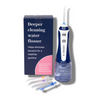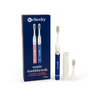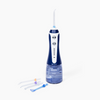When you struggle with anxiety, trying to fall asleep at night can turn into reliving your past mistakes or attempting to plan for the future. Either way, your brain keeps you up at night instead of allowing you to get the rest you need.
Adults need at least 6-8 hours of sleep each night, and the quantity and quality of your sleep directly impact your mental health. We’ve already talked about how sleep affects our health, so today, we’re gonna talk about different tricks you can try to get more restful sleep.
Anxiety And Sleep
According to the AADA, anxiety disorders are the most common mental health disorder in the United States, with over 40 million adults suffering from anxiety.
Chronic sleep disorders are a common side effect of anxiety, and unfortunately, anxiety is a common side effect of sleep disorders. Having one doesn’t necessarily mean you have the other, but having one increases the likelihood that you’ll have trouble with the other.
There are multiple types of anxiety disorders, with Generalized Anxiety Disorder (GAD) being the broadest diagnosis. Other anxiety disorders are diagnosed based on specific triggers like Social Anxiety Disorder (SAD), Post-Traumatic Stress Disorder (PTSD), and Obsessive-Compulsive Disorder (OCD), to name a few.
Everyone experiences anxiety from time to time because of various stressors in life. However, regular anxiety becomes a disorder when the fear and worry caused by stress become consistent, overwhelming, and debilitating.
When you worry, it’s harder to get to sleep; when it’s hard to sleep, you worry more.
If you believe you are suffering from an anxiety disorder, the best thing you can do is reach out to a therapist or talk to your primary care physician.
In the meantime, you can work some of these activities into your nighttime routine to help you reduce anxiety and get a better night’s sleep.
Deep Breathing Exercises
You can practice deep breathing at any part of your day, but it’s beneficial to do the exercises while lying in bed to calm your body. Breathing deep sends a message to your brain that lowers stress. (Hence why when you have a panic attack, it’s hard to catch your breath.)
You can practice deep breathing by sitting upright or laying on your back, with your hands in your lap or on your stomach. Some practices encourage you to count your breaths with one on the inhale and two on the exhale, all the way up to ten and starting again at one. Others suggest breathing in for a count of four, holding your breath for a count of four, and exhaling for a count of six.
No matter which way you choose to take deep breaths, inhaling through your nose and exhaling through your mouth is the most common technique for breathing exercises. You can do deep breathing in silence or with a form of white noise (ocean waves, rain sounds, etc.) playing in the background.
Meditation
There are multiple apps and YouTube videos that offer free (or highly affordable) guided meditations. Meditation is a fantastic way to combine deep breathing exercises with mindful thinking that can help you get your body ready to sleep. Consistent meditation practice has been known to help reduce anxiety.
Meditation is something you can start in small chunks and work your way up to longer sessions. You can do guided meditations that last only five minutes if that’s all you can begin with. The more you practice clearing your mind, the easier it will be to sustain.
Create A Sleep Routine
Research has suggested that falling into a pattern of falling asleep and getting up at the same time every day is helpful to restful sleep. Yes, that includes weekends and vacations.
While life gets in the way from time to time, the more you can normalize your sleep patterns, the easier it will be for you to drift off at night.
Establish A Nighttime Routine
Much like getting to bed at the same time each night is beneficial, having a wind-down routine can help you prepare your body for sleep. Your routine should be unique to you and consist of a string of events that make you feel calm.
Activities you can add to your nighttime routine include:
- Taking a warm bath or shower
- Listening to mellow music
- Reading
- Skincare
- Oral health care
- Planning out your schedule for the next day
- Cleaning your home
- Working on a project (i.e., puzzle, knitting, sketch, etc.)
- Meditation and Deep Breathing
Turn Off All Screens an Hour Before Bed
While it may be tempting to scroll through social media or watch TV until you fall asleep, staring at a screen only keeps you up longer. Screens emit a blue wavelength that has been proven to trick your brain into thinking it’s daytime.
An hour before you plan to sleep, turn off the screens and start your nighttime routine.
Stop Ingesting Stimulants Multiple Hours Before Bed
By stimulants, we mean coffee, alcohol, food, and other sources of caffeine that’ll keep you awake long past your bedtime.
Exercise
Exercising in the daytime is a great way to reduce anxiety and promote deeper sleep. Even something as simple as a long walk or a 20-minute HIIT routine can have a significant impact on your ability to get to sleep at the right time.
Use a Night Guard to Reduce Bruxism
People who suffer from sleep or anxiety disorders often experience chronic bruxism or TMD as a symptom. Grinding your teeth at night can disrupt the quality of your sleep, and a custom mouthguard is a great way to relieve some of the pressure on your Temporomandibular joint (TMJ).
Getting a custom nightguard used to be something you’d have to pay an arm and a leg for through your dentist’s office. Now, online services (like Cheeky) provide an affordable, efficient way to get a mouthguard that will help you sleep better at night.
You should be able to sleep soundly and wake up refreshed the next day. We’re here to help you improve your well-being in every way possible. For more information on a custom nightguard that will prevent you from grinding your teeth, explore our options here.











